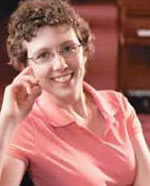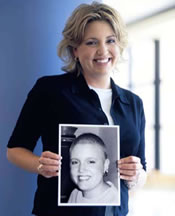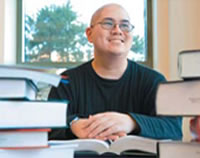Life, Interrupted
Facing cancer in the prime of youth
Valerie Delekta landed her first job as an elementary school music teacher in the summer of 2006. The job market in Michigan wasn't great, so she relocated in July to Atlanta, leaving behind a newly rekindled relationship with a boyfriend from college.
The job was going well, and when she started to feel sick, she just assumed it was run-of-the-mill germs from the kids. She's always been kind of clumsy, so she didn't think too much of the bruises all over her body, either. In September, she finally went to the doctor and had some blood tests. The doctor called back on a Sunday. She needed to go to the emergency room right away. Three days later, at age 23, she was diagnosed with leukemia.

"Down there, I had a job, even a good paying job for just being out of college," Delekta said. "And now I'm back here working part time, looking for substitute jobs and hoping next year to get a good permanent one." According to the Centers for Disease Control, less than 4 percent of newly diagnosed cancers are found in patients between the ages of 15 and 39.
Thanks to Web sites like Planet Cancer and books like Crazy, Sexy Cancer Tips, young people are connecting, writing a new storyline for a different kind of cancer experience. Here at the U-M Rogel Cancer Center, help is available closer to home -- and in person. Eighteen years ago, Jane Deering, a Rogel Cancer Center social worker, started a support group for young adults after noticing some of her Hodgkin's disease patients were uncomfortable talking to friends their own age who hadn't had cancer.
"As time went on, we learned that it wasn't just about people in active treatment. Post-treatment patients had lots of issues that cropped up at different points during survivorship: starting a new relationship, trying to build a career, wanting to have a child, fears of recurrence," Deering said. "What really impressed and surprised me most was that people continued to come years out from diagnosis."
Empathy from the Trenches
"YEAH, IT SUCKS, BUT WE'RE HERE, TOO."
That's how visitors are greeted at Planet Cancer, a Web site dedicated to providing a forum for young people with cancer. Like the Cancer Center's support group, the site is a safe haven where young adults can say whatever they need to -- even the stuff that would seem inappropriate or in bad taste in a different social setting.

Young people are young: They're irreverent, funny and ready to push back. Courtney Clark, director of marketing and development for the Web site and a two-year melanoma survivor, said the site reflects a certain silliness: She dubbed her tumor "Voldewort," a take on the villain of the Harry Potter series.
Connecting with other young people with cancer is vital because older people with cancer don't view it the same way and younger people without cancer don't get it, she said.
"The hardest thing about being a young adult with cancer is being disconnected from where you should be in the world," Clark said. "Right when you should be focusing on building a life, you're fighting for your life instead. A lot of things get thrown off track, and you wind up with this disconnect from the people around you. That, to me, was the isolating part."
That isolation is what Deering saw in an 18-yearold patient named Toni Spano. Diagnosed in 1989 with Hodgkins disease, Spano was always social, but she found that her diagnosis changed relationships with friends. One of Spano's closest friends was there for her in the beginning, but as time went on, her friend found a new best friend. Cancer proved too heavy for her boyfriend, too.
"The hardest thing about being a young adult with cancer is being disconnected from where you should be in the world." -- Toni Spano-English
Spano was one of the patients who inspired Deering to start the support group; Deering inspired Spano, too. Twenty years later, the Hodgkin's survivor is a social worker at the Rogel Cancer Center herself.
"My friends went on doing what they were supposed to be doing," said Spano-English, who is now married. "I chose to isolate myself. Cancer wasn't as common then; people didn't go around bald. I tried to act normal, like nothing was wrong, and that put a lot of pressure on me."
Tweeners of Medicine
James Geiger, M.D., a pediatric surgical oncologist at the U-M Rogel Cancer Center, said this age group faces a lot of unique stresses, stresses that pediatric oncologists may be better equipped to handle. Missing school and related social activities can be alienating.
"It's really important to involve the patient in decision- making," he said. "Many do better when they feel like at least they have some control."

For Jason Zao, that meant maintaining a long-held goal: graduating at the top of his class at Plymouth-Canton High School. Diagnosed with a brain tumor at 16, Zao was determined to take on as much as he did before he had cancer. Ten years later, he still thinks it was a good goal -- he did graduate at the top of his class -- but he had to make adjustments along the way.
After a second brain surgery and some time off, Zao enrolled at the University of Michigan in 2000, but it turned out to be too much. Instead, he graduated from Washtenaw Community College with an associate's degree in Web design before moving on to Eastern Michigan University, from which he graduated in April with a bachelor's of science in teaching and health education.
"When I first joined the Young Adult Support Group, I was very angry with the situation," said Zao, who, because of the poor job market, has gone back to school for another teaching endorsement in social studies. "But even the first year, it just got a lot easier. It felt good talking about it with the group and getting to know people. I feel good about still going even after cancer and being able to help other people."
The Disease, Not the Horoscope
And the group is trying to nudge Zao a bit, too. Although he's been talking about dating for the past year or two, it still doesn't seem like the right time, he said. But some of the group members keep telling him they're going to help him write a profile for Match.com. Dating can be tricky for young people who have had cancer. What do you tell? And how early in the relationship should you talk about it? Spano-English always let people know pretty early on.
"In some ways, it's a scare tactic," she said. "I'd throw it out there, and if they couldn't handle it, why put in the time now? I'd rather not get too attached."
For Delekta, the cancer diagnosis helped to solidify her relationship with her boyfriend, Phil. After her diagnosis, Phil, a doctoral student in U-M's Cellular and Molecular Biology Program, flew to Atlanta to visit during her 40-day stay in the hospital.
When Fertility Is Compromised
Fertility is a major concern for people with cancer who are not yet past their child-bearing years. The Cancer Center helps patients assess their options in its Fertility Counseling & Gamete Cryopreservation Clinic. The clinic offers counseling and education services as well as sperm - bank services for men and assistive reproductive technologies for women. For more information about the clinic, call 734-615-8143 or visit their web page
The two were playing a game after Delekta's blood stem cell transplant. As Delekta was downing her cocktail of pills for the night, Phil got down on his knee, pulled out a ring he had designed and proposed to Valerie.
"It was a really fun time despite it being crazy," Delekta said. "It certainly isn't a good thing that cancer happened, and I wouldn't necessarily say I'm glad, but at the same time, I've learned so much and grown closer to people. I wouldn't be living up here and married already. I'm enjoying it."
The Delektas would like to have children, but they know that Valerie's fertility may be compromised by her treatment. Like other young cancer patients, she'll just have to wait and see.
Which is what Spano-English had to do, too. She had prepared herself and her husband, Nick, for the possibility that she might not be able to have children. She had known others in the support group who adopted, but at age 37, she gave birth to a baby girl, Erin.
"Every time I'd talk with the doctors, they would tell me that there's really no test. The only way you'd know is if you try," Spano-English said. "I call my daughter an angel, and she truly is."
Continue reading the Spring, 2008 issue of Thrive.
